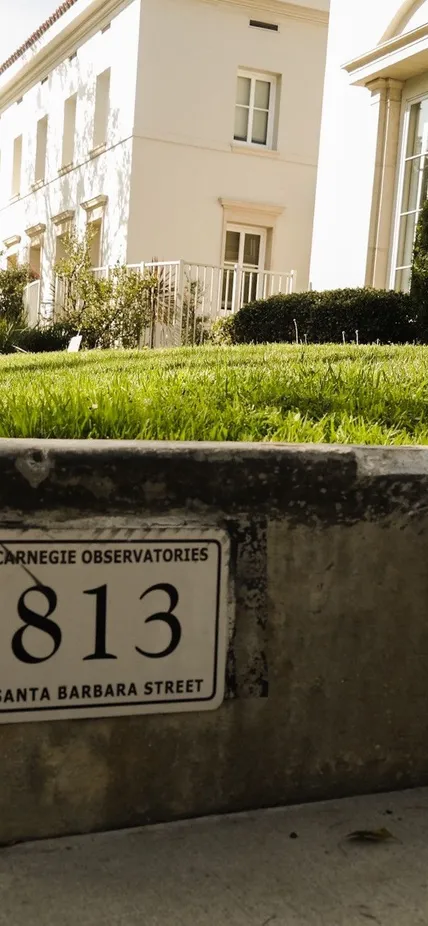Measuring the detailed chemistry of local galactic fossils.
Making predictions for the upcoming James Webb Space Telescope.
Studying the formation and evolution of galaxies.
This year’s undergraduate summer students worked on exciting, cutting edge astronomical research during their 10-week internships at The Observatories. The revamped program was both bigger and better thanks to the hard work of Observatories staff and postdocs, spearheaded by Dr. Gwen Rudie. “The summer internships give the students a chance to learn first hand what it's like to do scientific research. This experience is invaluable as they are deciding what career paths to take,” said Observatories Director John Mulchaey.
The 2016 cohort was the largest class ever, with 12 undergraduate students from seven different universities including: Barnard College, Caltech, Carleton College, Cerritos College, Pasadena City College, Pomona College, and the University of Virginia. The students were all at different stages in their undergraduate careers and came from a wide variety of backgrounds. Caltech Undergrad Mason MacDougall said, “I have enjoyed being around a new group of people, and exploring new topics in astrophysics. This summer has been good preparation for graduate school and the real world.”
This year’s newly expanded educational program was designed to teach skills that are imperative for succeeding in scientific careers, especially those which typically aren’t taught or focused on in the classroom. Oral presentation skills and scientific writing are best learned during an immersive research experience, and this year’s summer students had many opportunities to fine-tune their scientific communication. The Observatories provided an ideal atmosphere for these real-world lessons, with a supportive community of world-leading researchers, all working collaboratively at a flexible, independent research institution.
In expanding this program, Dr. Rudie was particularly inspired by her own undergraduate research experience, and wanted to give the Carnegie student researchers a similar foundation as they continue their scientific training. “I had a phenomenal undergraduate research advisor whose mentorship continued long past my graduation from Dartmouth. Organizing this program gives me the opportunity to ‘pay it forward’ to the community. I have a deep interest in equipping the next generation of astronomers with the technical and human skills they will need to continue in astrophysics or any other chosen career.”
The summer kicked off with a week-long “boot camp,” designed to give all students the basic research skills they needed to start their projects. This first week included crash courses in programming, data visualization, and scientific communication. Postdoctoral researchers Rachael Beaton and Johanna Teske along with Post Bac Researcher Erika Carlson developed a two day professional development program that combined group exercises with a data analysis task. Each team was given a different set of real astronomical data, and challenged to find patterns and meaning - an authentic research inquiry.
Throughout the rest of the summer, the students spent most of their time working on scientific research with their advisors. They also met weekly to present their progress and have the opportunity to ask questions of Observatories staff. Haley Fica worked on an instrumentation project over the summer: “I got to work with people you wouldn’t typically get to work with on a summer project -- Carnegie’s scientists, machinists, electricians, and mechanical engineers have all been amazing.” Continuing the professional development, the students heard from a panel of outside graduate students on their perspectives, honed their scientific writing skills, and discussed the mentor-mentee relationship and impostor syndrome.
There were even field trips, including a visit to the Glendale Community College Planetarium, the California Science Center, and an “observing run” at the historic Mount Wilson Observatory, the original astronomical facilities built by the Carnegie Observatories. Pasadena City College student Sandy Moak said "The field trips allowed us to get to know each other in a different setting, and it added so much to the overall summer program. It was incredible to see the history at Mount Wilson, and then to go and look through the 60-inch telescope was so inspiring."
Pomona undergraduate Nick Diao praised Dr. Rudie's efforts. “Gwen did an amazing job bringing all the students and researchers together. The group meetings, the lunches, the talks, and emphasis she’s put on openness and intermingling helps students to feel at home, but also pushed people to do better and work harder. She created an experience for the better,” said Diao.
Most of the students will present their research at the upcoming American Astronomical Society Meeting in Texas. “A very high fraction of these undergraduates go on to pursue careers in science. It's very rewarding to know we are playing a big role in inspiring and training the next generation of scientists,” said Director Mulchaey.
